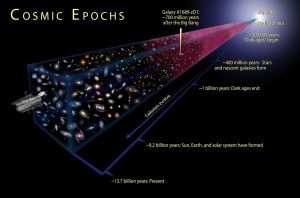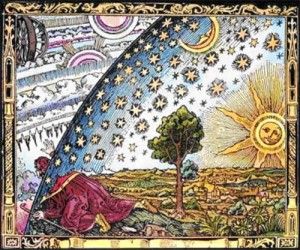Consider how many natural laws and constants—both physical and chemical—have been discovered since the time of the early Greeks. Hundreds of thousands of natural laws have been unveiled in man’s never ending quest to understand Earth and the universe.
I couldn’t name 1% of the laws of nature and physics. Here are just a few that come to mind from my high school science classes. I shall not offer a bulleted list, because that would suggest that these random references to laws and constants are organized or complete. It doesn’t even scratch the surface…
Newton’s Law of force (F=MA), Newton’s law of gravity, The electromagnetic force, strong force, weak force, Avogadro’s Constant, Boyle’s Law, the Lorentz Transformation, Maxwell’s equations, laws of thermodynamics, E=MC2, particles behave as waves, superpositioning of waves, universe inflation rate, for every action… etc, etc.
For some time, physicists, astronomers, chemists, and even theologians have pondered an interesting puzzle: Why is our universe so carefully tuned for our existence? And not just our existence—After all, it makes sense that our stature, our senses and things like muscle mass and speed have evolved to match our environment. But here’s the odd thing—If even one of a great many laws, properties or constants were off by even a smidgen, the whole universe could not exist—at least not in a form that could support life as we imagine it! Even the laws and numbers listed above. All of creation would not be here, if any of these were just a bit off…
Well, there might be something out there, but it is unlikely to have resulted in life—not even life very different than ours. Why? Because without the incredibly unique balance of physical and chemical properties that we observe, matter would not coalesce into stars, planets would not crunch into balls that hold an atmosphere, and they would not clear their path to produce a stable orbit for eons. Compounds and tissue would not bind together. In fact, none of the things that we can imagine could exist.
Of course, theologians have a pat answer. In one form or another, religions answer all of cosmology by stating a matter of faith: “The universe adheres to God’s design, and so it makes sense that everything works”. This is a very convenient explanation, because these same individuals forbid the obvious question: ‘Who created God?’ and ‘What existed before God?’ Just ask Bill Nye or Bill Maher. They have accepted offers to debate those who feel that God created Man instead of the other way around.
Scientists, on the other hand, take pains to distance themselves from theological implications. They deal in facts and observable phenomenon. Then, they form a hypotheses and begin testing. That’s what we call the scientific method.
If any being could evolve without the perfect balance of laws and constants that we observe, it would be a single intelligence distributed amongst a cold cloud of gas. In fact, a universe that is not based on many of the observed numbers (including the total mass of everything in existence) probably could not be stable for very long.
 Does this mean that it’s all about you?! Are you, Dear reader, the only thing in existence?—a living testament to René Descartes?
Does this mean that it’s all about you?! Are you, Dear reader, the only thing in existence?—a living testament to René Descartes?
Don’t discount that notion. Cosmologists acknowledge that your own existence is the only thing of which you can be absolutely sure. (“I think. Therefore, I am”). If you cannot completely trust your senses as s portal to reality, then no one else provably exists. But, most scientists (and the rest of us, too) are willing to assume that we come from a mother and father and that the person in front of us exists as a separate thinking entity. After all, if we can’t start with this assumption, then the rest of physics and reality hardly matters, because we are too far removed from the ‘other’ reality to even contemplate what is outside of our thoughts.
Two questions define the field of cosmology—How did it all begin and why does it work? Really big questions are difficult to test, and so we must rely heavily on tools and observation:
• Is the Big Bang a one-off event, or is it one in a cycle of recurring events?
• Is there anything beyond the observable universe? (something apart from the Big Bang)
• Does natural law observed in our region of the galaxy apply everywhere?
• Is there intelligent life beyond Earth?
Having theories that are difficult to test does not mean that scientists aren’t making progress. Even in the absence of frequent testing, a lot can be learned from observation. Prior to 1992, no planet had ever been observed or detected outside of our solar system. For this reason, we had no idea of the likelihood that planets form and take orbit around stars.
Today, almost 2000 exoplanets have been discovered with 500 of them belonging to multiple planetary systems. All of these were detected by indirect evidence—either the periodic eclipsing of light from a star, which indicates that something is in orbit around it, or subtle wobbling of the star itself, which indicates that it is shifting around a shared center of gravity with a smaller object. But wait! Just this month, a planet close to our solar system (about 30 light years away) was directly observed. This is a major breakthrough, because it gives us an opportunity to perform spectral analysis of the planet and its atmosphere.
Is this important? That depends on goals and your point of view. For example, one cannot begin to speculate on the chances for intelligent life, if we have no idea how common or unusual it is for a star to be orbited by planets. It is a critical factor in the Drake Equation. (I am discounting the possibility of a life form living within a sun, not because it is impossible or because I am a human-chauvinist, but because it would not likely be a life form that we will communicate with in this millennium).
 Of course, progress sometimes raises completely new questions. In the 1970s, Francis Drake and Carl Sagan began exploring the changing rate of expansion between galaxies. This created an entirely new question and field of study related to the search for dark matter.
Of course, progress sometimes raises completely new questions. In the 1970s, Francis Drake and Carl Sagan began exploring the changing rate of expansion between galaxies. This created an entirely new question and field of study related to the search for dark matter.
Concerning the titular question: “Why is the universe fine-tuned for life?”, cosmologist Stephen Hawking offered an explanation last year that might help us to understand. At last, it offers a theory, even if it is difficult to test. The media did their best to make Professor Hawking’s explanation digestible, explaining it something like this [I am paraphrasing]:
There may be multiple universes. We observe only the one in which we exist. Since our observations are limited to a universe with physical constants and laws that resulted in us—along with Stars, planets, gravity and atmospheres, it seems that the conditions for life are all too coincidental. But if we imagine countless other universes outside of our realm (very few with life-supporting properties), then the coincidence can be dismissed. In effect, as observers, we are regionalized into a small corner.
 The press picked up on this explanation with an unfortunate headline that blared the famous Professor had proven that God does not exist. Actually, Hawking said that miracles stemming out of religious beliefs are “not compatible with science”. Although he is an atheist, he said nothing about God not existing. He simply offered a theory to explain an improbable coincidence.
The press picked up on this explanation with an unfortunate headline that blared the famous Professor had proven that God does not exist. Actually, Hawking said that miracles stemming out of religious beliefs are “not compatible with science”. Although he is an atheist, he said nothing about God not existing. He simply offered a theory to explain an improbable coincidence.
I am not a Cosmologist. I only recently have come to understand that it is the science of origin and is comprised of astronomy, particle physics, chemistry and philosophy. (But not religion—please don’t go there!). If my brief introduction piques your interest, a great place to spread your wings is with Tim Maudlin’s recent article in Aeon Magazine, The Calibrated Cosmos. Tim succinctly articulates the problem of a fine-tuned universe in the very first paragraph:
“Theories now suggest that the most general structural elements of the universe — the stars and planets, and the galaxies that contain them — are the products of finely calibrated laws and conditions that seem too good to be true.”
And: “Had the constants of nature taken slightly different values, we would not be here.”
The article delves into the question thoroughly, while still reading at a level commensurate with Sunday drivers like you and me. If you write to Tim, tell him I sent you. Tell him that his beautifully written article has added a whole new facet to my appreciation for being!
Philip Raymond is Co-Chair of The Cryptocurrency Standards Association and CEO of Vanquish Labs.
This is his fourth article for Lifeboat Foundation and his first as an armchair cosmologist.
Related: Quantum Entanglement: EPR Paradox
